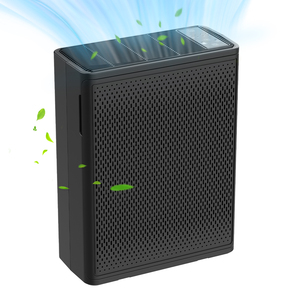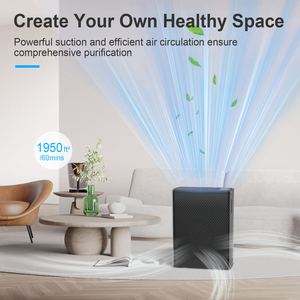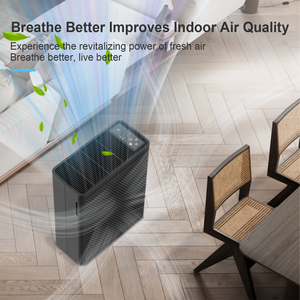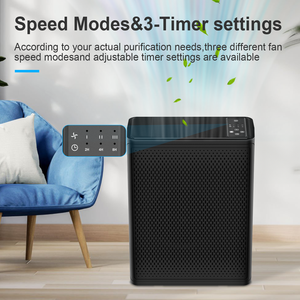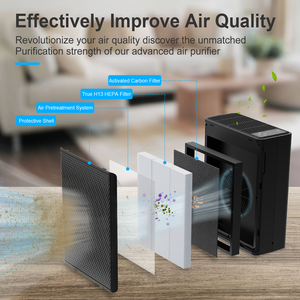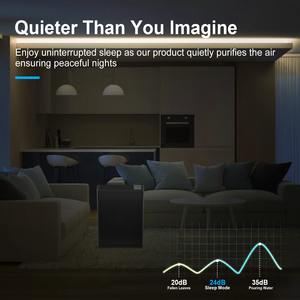Types of Dropshipping Air Purifiers
Wholesale air purifiers vary in design and functionality to meet different preferences and requirements. Here are some common types of air purifiers.
-
HEPA Air Purifier
High Efficiency Particulate Air (HEPA) purifiers have filters capable of removing particles from the air as small as 0.3 micrometers with an efficiency of 99.97%. Dust, pollen, pet dander, mold spores, and other allergens are some of the common allergens that HEPA filters can capture. However, HEPA filters can be heavy and costly, and they also need regular replacement. Also, air droplets smaller than 0.1 micrometers can pass through HEPA filters and remain suspended in the air.
-
Activated Carbon Air Purifier
Activated carbon purifiers use a filter made of carbon or charcoal to remove volatile organic compounds (VOCs), harmful gases, and smells from the air. The carbon filter adsorbs these particles through activated carbon's tiny pores. Combining activated carbon filters with HEPA filters in air purifiers improves the quality of indoor air. The filters capture particles and further eliminate odors, gases, and toxic chemicals from the air. The filters also help reduce formaldehyde from household furniture, building materials, and cigarette smoke.
-
UV Air Purifier
Ultraviolet (UV) air purifiers use shortwave UV light to kill and reduce bacteria, mold spores, and viruses in the air. Using UV light to disinfect the air is a non -chemical method of cleaning the air. UV air purifiers are often used in hospitals, labs, and areas that need a high level of air quality. However, these purifiers should not be used alone to purify the air because they do not remove odors, particles, or harmful gases from the air.
-
Ionizer Air Purifier
Ionizer air purifiers release charged particles (ions) into the air to remove allergens and purify the air. The ions attach themselves to pollutants and odor particles, making them heavy so they can fall to the ground or get stuck on walls. However, ionizers may release ozone, which can be harmful to people with asthma or sensitive lungs.
-
Other Air Purifiers
Other air purifiers use different methods to purify the air. These models combine several ways to clean the air, including using ultraviolet light, activated carbon, and electrostatic precipitation. Common types of air purifiers include photocatalytic purifiers, ozone air purifiers, and hybrid purifiers.
Functions and features of dropshipping air purifiers
Wholesale air purifiers come in various models, which may have different features. However, several functions and features are common among most air purifiers. They include the following.
Functions of air purifiers
Air purifiers serve several essential functions to improve indoor air quality and create a healthier and more comfortable environment at home or in commercial places.
- Remove airborne particles: An air purifier traps and removes dust, pet hair, and pollen from the air. This helps allergy sufferers by reducing common allergens that can trigger allergy symptoms or asthma, creating a more pleasant and comfortable indoors.
- Eliminate odours: Purifiers with activated carbon filters effectively eliminate bad odours caused by smoking, pets, cooking, or mould. These air cleansers also absorb chemical scents from paints, new furnishings, or strong industrial odors.
- Removes hazardous particles: Some bacteria and viruses can be as small as 0.01microns. HEPA filters can trap and remove these hazardous particles from the air, reducing the risk of respiratory infection and other illnesses.
- Improve air circulation: Air purifiers help improve air circulation in a room. Most models have a fan that promotes air movement, ensuring that the air within the space is fresh and filtered.
- Removing VOCs: Volatile Organic Compounds are chemicals found in many cleaning agents, air fresheners, and paints. These harmful substances can cause headaches, breathing issues, or irritation. A good quality air purifier can reduce VOCs and create a safer, more comfortable environment.
Features of dropshipping air purifiers
Wholesale air purifiers can have the following features:
- True HEPA filter: HEPA filters are essential in most air purifiers. They help remove 99.97% of the particles from the air. However, many manufacturers use the word HEPA lightly, and the filters do not meet the standard HEPA specification. True HEPA filters are high-quality filters that trap and remove particles as small as 0.3 microns.
- Smart air purifiers: These smart air purifiers have features like WiFi connectivity or a built-in air quality sensor. Users can control them remotely on their smartphone or receive updates on their air quality in real time. Smart air purifiers offer a convenient way to manage indoor air quality.
- UV-C light: An air purifier with UV light effectively eliminates bacteria, viruses, dust mites, and pet allergens. UV-C light works by damaging the germs' DNA or RNA, preventing them from replicating or causing infections.
- Fragrance diffusers: Some air purifiers have built-in fragrance diffusers designed to work with essential oils. These fragrance diffusers add pleasant aromas to the air while purifying it.
- Auto mode: air purifiers with auto mode provide worry-free operation. They have built-in sensors that monitor the air quality in real time. These sensors detect changes in the air quality and automatically adjust the fan speed.
Usage scenario of dropshipping air purifiers
Air purifiers are used in many settings to improve indoor air quality. According to market research, the global air purifier market is projected to reach over $38 billion by 2031. This shows a steady increase in demand for air purifiers, which presents a lucrative business opportunity. Here are some usage scenarios of dropshipping air purifiers:
- Home use: Many people use air purifiers in their homes to remove allergens, dust, pet dander, and other pollutants from the air. Purifiers are placed in common areas like the living room or bedroom.
- Office spaces: Business owners use air purifiers to improve air quality in the office. Cleaner air makes a conducive working environment and increases employee productivity. Also, people working in industries with high levels of air pollution use respirators to filter out harmful particles from the air.
- Healthcare facilities: Hospitals, clinics, and other healthcare facilities use air purifiers to maintain good air quality. They are especially useful in allergy, asthma, and COPD patients' waiting and treatment rooms. They are also used in operating rooms to reduce contaminants and improve ventilation.
- Schools and universities: Air purifiers are used in classrooms, libraries, and other indoor areas to create a healthy learning environment for students and staff.
- Air purifier plant: Air purifiers are used in industrial settings to remove harmful particles, VOCs, and other air pollutants to comply with safety regulations. Air purifier factories are equipped with different filtration systems to remove various contaminants from the air. Oil mist separators and other types of air filters are commonly used in various industries to maintain clean air in the workplace.
- Basement and garage: Dropshipping air purifiers with HEPA filters is a good idea because they effectively reduce dust, mold, and pet dander. Air quality is improved in garages and basements, which tend to have poor ventilation.
How to Choose Dropshipping Air Purifier
When selecting air purifiers for dropshipping, it's important to choose models that meet customer needs, trends, and reliable suppliers to ensure product quality and customer satisfaction.
- Define the target market: Conduct market research to identify the target market and customer segments. Determine whether the air purifier is primarily for residential use, commercial spaces, or specific industries.
- Select air purifiers with diverse features: Consider different air purifier models that incorporate distinct features, such as smart connectivity, multi-functionality, portable design, or energy efficiency. These unique selling propositions can attract a broader customer base.
- Check supplier credentials and reviews: Thoroughly review the supplier's profile, certifications, and ratings. Check for any reviews or feedback on the supplier's products to ensure they have a reliable track record in producing high-quality air purifiers.
- Examine product quality: Ensure that the air purifier has met quality standards and is durable. Look more closely at the construction, filters, and any additional features to ensure they are of sufficient quality. Verify that the supplier can provide consistent air purifier quality over time.
- Inquire about product testing and certifications: Ask the supplier if their air purifiers have undergone any testing or certifications to guarantee their performance and efficiency. Depending on the target market, certain certifications, such as HEPA filter certification or energy efficiency ratings, may be required.
- Review shipping and logistics: Ensure the supplier has efficient shipping processes and reliable logistics partners to get orders to customers on time. Evaluate packaging to ensure it protects the product during transit and minimizes the risk of damage.
Q & A
Q: Can a dropshipping air purifier reduce energy costs?
A: Yes, air purifiers can help reduce energy costs by removing dust and allergens from the air, which allows HVAC systems to run more efficiently.
Q: Is it possible to use multiple air purifiers in one room?
A: Yes, using more than one air purifier in a single room is still helpful. It can decrease the time to clean the air, but it also increases energy consumption and cleaning the filters.
Q: How often should filters be replaced or cleaned in dropshipping air purifiers?
A: The requirement to replace or clean filters in air purifiers depends on the model and usage. HEPA filters usually need replacement after one to two years, while washable filters require cleaning once a year.
Q: How do air purifiers affect indoor humidity levels?
A: Air purifiers remove moisture from the air, which can lower indoor humidity levels. However, the dropshipping air purifier's impact on humidity levels depends on the model and room size.
Q: Can air purifiers help with pet odors?
A: Yes, air purifiers can help remove the smell of pets and other odors from the air. Air purifiers with activated carbon filters are very effective at eliminating odors.
Q: Does the air purifier eliminate the need for venting while cooking?
A: No, cooking releases pollutants such as carbon monoxide and harmful gases that the air purifier cannot filter. Venting while cooking is still important for good indoor air quality.




























